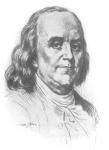
Read a tribute in the Washington Post to the great man.
Perhaps the founding father of "Knowledge for Development" in what was to become the United States of America. Scientist, inventor, social innovator, economist, writer, editor, publisher, educator, founder of the first lending library, humorist, and sage, Franklin was born in Boston on Jan. 17, 1706.
The Autobiography of Benjamin Franklin is considered to be the greatest autobiography produced in Colonial America.
Franklin was the only person to have signed all four of the documents which helped to create the United States: the Declaration of Independence (1776), the Treaty of Alliance, Amity, and Commerce with France (1778), the Treaty of Peace between England, France, and the United States (1782), and the Constitution (1787). He actually helped to write parts of the Declaration of Independence and the Constitution. No other individual was more involved in the birth of this nation.
Among the quotations from Franklin, one finds:
"If a man empties his purse into his head no one can take it away from him. An investment in knowledge always pays the best interest."
"Furnished as all Europe now is with Academies of Science, with nice instruments and the spirit of experiment, the progress of human knowledge will be rapid and discoveries made of which we have at present no conception. I begin to be almost sorry I was born so soon, since I cannot have the happiness of knowing what will be known a hundred years hence."
"Genius without education is like silver in the mine."
"The definition of insanity is doing the same thing over and over and expecting different results."
"We assemble parliaments and councils, to have the benefit of their collected wisdom; but we necessarily have, at the same time, the inconvenience of their collected passions, prejudices, and private interests. By the help of these, artful men overpower their wisdom, and dupe its possessors; and if we may judge by the acts, arrêts, and edicts, all the world over, for regulating commerce, an assembly of great men is the greatest fool upon earth."
"Those who govern, having much business on their hands, do not generally like to take the trouble of considering and carrying into execution new projects. The best public measures are therefore seldom adopted from previous wisdom, but forced by the occasion."
"We are more thoroughly an enlightened people, with respect to our political interests, than perhaps any other under heaven. Every man among us reads, and is so easy in his circumstances as to have leisure for conversations of improvement and for acquiring information."
"Without Freedom of Thought, there can be no such Thing as Wisdom; and no such Thing as publick Liberty, without Freedom of Speech."
"A plural Legislature is as necessary to good Government as a single Executive. It is not enough that your Legislature should be numerous; it should also be divided. Numbers alone are not a sufficient Barrier against the Impulses of Passion, the Combinations of Interest, the Intrigues of Faction, the Haste of Folly, or the Spirit of Encroachment. One Division should watch over and controul the other, supply its Wants, correct its Blunders, and cross its Designs, should they be criminal or erroneous. Wisdom is the specific Quality of the Legislature, grows out of the Number of the Body, and is made up of the Portions of Sense and Knowledge which each Member brings to it."
"God grant, that not only the Love of Liberty, but a thorough Knowledge of the Rights of Man, may pervade all the Nations of the Earth, so that a Philosopher may set his Foot anywhere on its Surface, and say, 'This is my Country.'"
"Experience keeps a dear school, but fools will learn in no other."
"Who is wise? He that learns from every One. Who is powerful? He that governs his Passions. Who is rich? He that is content. Who is that? Nobody."
"I confess that there are several parts of this Constitution which I do not at present approve, but I am not sure I shall never approve them. For having lived long, I have experienced many instances of being obliged by better information, or fuller consideration, to change opinions even on important subjects, which I once thought right, but found to be otherwise."
And perhaps unusually pertinent for this time:
"In these sentiments, sir, I agree to this Constitution, with all its faults, if they are such; because I think a General Government necessary for us, and there is no form of government, but what may be a blessing to the people if well administered; and believe further, that this is likely to be well administered for a course of years, and can only end in despotism, as other forms have done before it, when the people shall become so corrupted as to need despotic government, being incapable of any other."
No comments:
Post a Comment